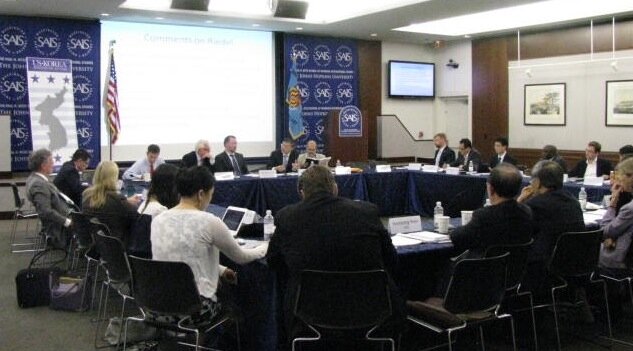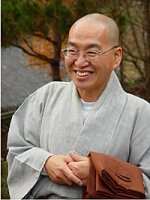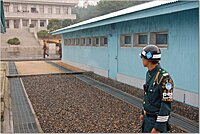Friday, Apr 26, 2013 – Film Screening of "Unfortunate Brothers: Korea's Reunification Dilemma"
Stories Filed Under “Unification”
1st USKI Forum on Development and Transition Economies

Buddhism in Asia: Peace and Reconciliation on the Korean Peninsula
 Venerable Pomnyun Sunim addressed the role Buddhism has played in defining modern Asia’s religious, cultural, social, political, and economic dynamics. A long-time activist and advocate for human rights, Venerable Pomnyun has worked extensively on advocating peace within the Korean peninsula, including working to supply humanitarian aid to famine victims in North Korea and defending the human rights of North Korean refugees in China. His dedication to Buddhist ideals has not only brought accolades to his work, but has shaped his outlook on the prospects for peace and reconciliation between North and South Korea. read more …
Venerable Pomnyun Sunim addressed the role Buddhism has played in defining modern Asia’s religious, cultural, social, political, and economic dynamics. A long-time activist and advocate for human rights, Venerable Pomnyun has worked extensively on advocating peace within the Korean peninsula, including working to supply humanitarian aid to famine victims in North Korea and defending the human rights of North Korean refugees in China. His dedication to Buddhist ideals has not only brought accolades to his work, but has shaped his outlook on the prospects for peace and reconciliation between North and South Korea. read more …
WPS 09-3: Post-Unification Korean National Identity, by Jee Sun Lee, Ph.D. (April 2009)
WPS 09-3: Post-Unification Korean National Identity, by Jee Sun Lee, Ph.D. (April 2009). While much of the debate about the future of the Korean peninsula has taken shape around the uncertainties surrounding Kim Jong Il succession and portended changes in political structures, the future of Korean national identity remains an underexamined subject. In this paper, Dr. Lee addresses the looming question of what will be the core identity of a unified North and South Korea, and what form Korean national consciousness will take.
WPS 08-7: Ending the Korean War: Considerations on the Role of History, by Kathryn Weathersby, Ph.D. (Dec. 2008)
WPS 08-7: Ending the Korean War: Considerations on the Role of History, by Kathryn Weathersby, Ph.D. (Dec. 2008). In this paper, Dr. Weathersby argues that as the complex task of constructing a peace regime on the Korean peninsula begins, constant confrontation with historical inquiry, which undercuts the natural tendency to simplify and distort the past into national myths that hinder reconciliation, will be necessary.
Venerable Pomnyun and Dr. Cho Seong-Ryoul on Social and Political Change in North Korea
September 24, 2008
Venerable Pomnyun Sunmin and his delegation of North Korea experts came to SAIS to talk about the current situation in North Korea. His delegation was composed of experts from various institutions in South Korea and make up The Peace Foundation and Good Friends’ organizations. He brought a collection of experts on political, economic, unification, defense, and security matters.
Venerable Pomnyun began the evening describing the developing famine in North Korea and its differences from the famine that affected the country in the 1990s; the primary difference being that the famine had affected the lower echelons of the party. The famine has also created secondary affects in increase in petty crime and the development of a market system. The delegation then discussed the political situation and possible four scenarios as it relates to North Korea and its relations with the U.S. and South Korea that can come out of the current impasse. (Summary by Mike Yo, Korea Studies, SAIS). read more …
IRP Gatekeeper Editors Report from Korea
November 29, 2007
 The International Reporting Project (IRP) at SAIS provided editors and producers from top U.S. news organizations with the opportunity to take a 10-day fact-finding tour of Korea, including a 26-hour visit to North Korea. The U.S.-Korea Institute at SAIS cosponsored this program with IRP to provide a space for them to discuss their findings on the future of Korean unification, South Korean presidential politics, prospects for the Free Trade Agreement and the future of U.S.-Korean relations.
The International Reporting Project (IRP) at SAIS provided editors and producers from top U.S. news organizations with the opportunity to take a 10-day fact-finding tour of Korea, including a 26-hour visit to North Korea. The U.S.-Korea Institute at SAIS cosponsored this program with IRP to provide a space for them to discuss their findings on the future of Korean unification, South Korean presidential politics, prospects for the Free Trade Agreement and the future of U.S.-Korean relations.
The Gatekeepers’ visit to Korea coincided with a trip to North Korea by a U.S. technical team that arrived to dismantle North Korea’s nuclear reactor at Yongbyon. The IRP Gatekeepers spent most of their trip in South Korea, where they interviewed a wide cross-section of leaders in government, politics, business, health, academics, media and other walks of life.
Download Crossing the Divide: IRP Gatekeeper Editors Cover the Two Koreas.
Listen or download audio from the event.
Featured speakers
Will Englund, Associate Editorial Page Editor, The Baltimore Sun
Ray Locker, National Security Editor, USA Today
Michael Mosettig, Senior Producer, NewsHour with Jim Lehrer
Patrick Pexton, SAIS alum and Deputy Editor, The National Journal
![]()

